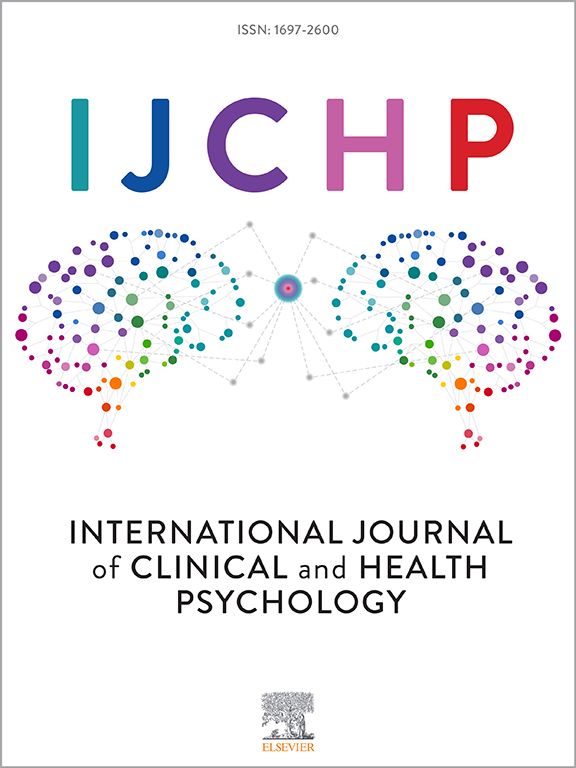Slow-wave sleep, oxygen desaturation, and memory consolidation in sleep-disturbed individuals
IF 4.4
1区 心理学
Q1 PSYCHOLOGY, CLINICAL
International Journal of Clinical and Health Psychology
Pub Date : 2025-04-01
DOI:10.1016/j.ijchp.2025.100574
引用次数: 0
Abstract
Slow-wave sleep (SWS) plays a crucial role in memory consolidation, yet its disruption in obstructive sleep apnea (OSA) remains poorly understood. This study investigates the relationship between SWS characteristics, nocturnal oxygen desaturation, and memory performance in individuals with sleep disturbances. This cross-sectional study included 49 participants with memory complaints and sleep disturbances who underwent overnight polysomnography (PSG) and cognitive assessments to determine the presence and severity of OSA. SWS parameters, including the slow-wave index, amplitude, and duration, were extracted from PSG data alongside the apnea-hypopnea index (AHI) and oxygen desaturation index (ODI-3 %). Memory consolidation was assessed pre- and post-sleep using the Word Sequence Learning Test (WSLT), with the WSLT-Memory Index Score (WSLT-MIS) as the primary outcome measure. Multiple linear regression models adjusted for age, BMI, and education were used to analyze associations between sleep parameters and memory outcomes. Higher ODI-3 % and AHI were significantly associated with poorer memory consolidation, as indicated by lower WSLT-MIS scores (p < 0.05). AHI during NREM sleep was more strongly associated with poorer memory consolidation compared to AHI during REM sleep. Conversely, a higher slow-wave index was positively correlated with better WSLT-MIS scores and retention rates (p < 0.05). These findings highlight the critical role of SWS in memory consolidation and the detrimental effects of OSA-related sleep disturbances. While CPAP therapy remains the standard treatment for improving oxygenation and reducing sleep fragmentation in OSA, additional strategies aimed at enhancing SWS may further support cognitive function. Longitudinal studies and neuroimaging approaches are needed to better understand the mechanisms linking SWS enhancement and cognitive health.
睡眠障碍个体的慢波睡眠、氧饱和度降低和记忆巩固
慢波睡眠(SWS)在记忆巩固中起着至关重要的作用,但其在阻塞性睡眠呼吸暂停(OSA)中的破坏作用仍然知之甚少。本研究探讨了睡眠障碍个体的SWS特征、夜间氧饱和度和记忆表现之间的关系。这项横断面研究包括49名有记忆抱怨和睡眠障碍的参与者,他们接受了夜间多导睡眠描记仪(PSG)和认知评估,以确定OSA的存在和严重程度。从PSG数据中提取SWS参数,包括慢波指数、振幅和持续时间,以及呼吸暂停低通气指数(AHI)和氧去饱和指数(odi - 3%)。使用单词序列学习测试(WSLT)评估睡眠前和睡眠后的记忆巩固,以WSLT-记忆指数评分(WSLT- mis)作为主要结果测量。使用调整了年龄、BMI和教育程度的多元线性回归模型来分析睡眠参数与记忆结果之间的关系。较高的odi - 3%和AHI与较差的记忆巩固显著相关,正如较低的WSLT-MIS分数所表明的那样(p <;0.05)。与快速眼动睡眠期间的AHI相比,非快速眼动睡眠期间的AHI与较差的记忆巩固更密切相关。相反,较高的慢波指数与较好的WSLT-MIS分数和保留率呈正相关(p <;0.05)。这些发现强调了SWS在记忆巩固中的关键作用以及osa相关睡眠障碍的有害影响。虽然CPAP治疗仍然是改善OSA患者氧合和减少睡眠碎片的标准治疗方法,但旨在增强SWS的其他策略可能会进一步支持认知功能。需要纵向研究和神经影像学方法来更好地理解连接SWS增强和认知健康的机制。
本文章由计算机程序翻译,如有差异,请以英文原文为准。
求助全文
约1分钟内获得全文
求助全文
来源期刊

International Journal of Clinical and Health Psychology
PSYCHOLOGY, CLINICAL-
CiteScore
10.70
自引率
5.70%
发文量
38
审稿时长
33 days
期刊介绍:
The International Journal of Clinical and Health Psychology is dedicated to publishing manuscripts with a strong emphasis on both basic and applied research, encompassing experimental, clinical, and theoretical contributions that advance the fields of Clinical and Health Psychology. With a focus on four core domains—clinical psychology and psychotherapy, psychopathology, health psychology, and clinical neurosciences—the IJCHP seeks to provide a comprehensive platform for scholarly discourse and innovation. The journal accepts Original Articles (empirical studies) and Review Articles. Manuscripts submitted to IJCHP should be original and not previously published or under consideration elsewhere. All signing authors must unanimously agree on the submitted version of the manuscript. By submitting their work, authors agree to transfer their copyrights to the Journal for the duration of the editorial process.
 求助内容:
求助内容: 应助结果提醒方式:
应助结果提醒方式:


